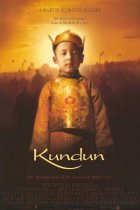
Kundun Page #5
- PG-13
- Year:
- 1997
- 134 min
- 1,175 Views
The senior LAYMAN is on his knees, speaking.
LAYMAN:
I believe that the Regent is asking
for too high a reward for his part in
finding the Dalai Lama. Too much
money, too much land.
INT. HALLWAY DAY
Tenzin Gyatso peeks through a door at the great assembly.
The Lord Chamberlian stands behind him.
INT. GREAT HALL DAY
The Layman continues.
LAYMAN:
Our treasuries are empty. Our army
is depleted. He would have us pull
the hair from our noses.
INT. HALLWAY DAY
The Dalai Lama is confused, but continues listening.
The Layman returns to his cross-legged position.
The senior MONK speaks.
MONK:
We note this. Now, the Chinese.
There is audible expression of tension.
MONK:
The Allies wish to build a supply-
road from India, crossing Tibet, as
part of their war effort. The road
would lead directly to China.
The Layman gets to his knees.
LAYMAN:
We cannot allow it.
Right now, we have a only a small
Chinese mission in Lhasa, the first
since the Thirteenth Dalai Lama
threw them out in 1912.
The road would increase the size of
that mission. The Chinese would
try to control our trade, as they did
once before, control our contact
with the outside world.
INT. HALLWAY DAY
The Lord Chamberlain touches the boy's shoulder and Tenzin
Gyatso leaves his hiding place, as the speaker's voice fades
away.
As the two walk down the hallway, Tenzin Gyatso spots an
unusual wooden door. He lets the Lord Chamberlain get a
little bit ahead of him, and then the boy tries the door.
It is heavy. It almost opens.
INT. HALLWAY LATER, DUSK
Tenzin Gyatso and his brother Lobsang are pulling at the
heavy door. Behind them, in the distance, we hear:
MONKS (OC)
Kundun! Kundun!
The door opens. The boys disappear inside.
A treasure awaits them.
It looks like Aladdin's cave - full of odd, European items.
There are glittering music boxes, a porcelain sink, a gilded
mirror, a lacquered rocking horse. There are hats,
umbrellas and even a pair of lace-up, cordovan shoes.
Tenzin Gyatso lifts a reel of film. There are piles of
magazines and books. There is a stack of tires in the back
corner. The boys uncover a train set and a good collection
of lead soldiers. The Dalai Lama pockets a gold watch.
Just as the monks find their young charges and we hear them
at the door, Tenzin sees something truly spectacular. It is
a telescope.
The monks enter the room as the young Dalai Lama reaches for
this miracle.
TENZIN GYATSO:
What is it?
THE ATTENDANTS:
Ah, it is a telescope, Holiness.
With this you can see a long way.
TENZIN GYATSO:
And, is it mine?
ATTENDANT:
These are all gifts sent to
your predecessors.
LOBSANG SAMTEN:
Yes! Then it is yours!
TENZIN GYATSO:
I need it.
INT. DALAI LAMA'S PRIVATE ROOMS NIGHT
We are in the adjacent room, listening, as Norbu Thundrup
tells a bedtime story.
Golden butter lamps burn before a statue of Buddha.
NORBU THUNDRUP (OC)
One night, not too long
ago, an old monk saw a woman in that
very same hallway where you ran away.
INT. BEDROOM NIGHT
The boy is in bed. The Sweeper finishes-off his story as
the boy wiggles deeper under the covers.
NORBU THUNDRUP:
She carried a basket in
her arms, a big, heavy basket, and
the old monk cautiously approached.
She opened her basket and showed what
she had. Heads. Human heads. Only
the heads.
TENZIN GYATSO:
Is that true or pretend?
NORBU THUNDRUP:
It is a story, you decide.
TENZIN GYATSO:
Pretend.
NORBU THUNDRUP:
As you say.
The Sweeper tucks the boy in as the Master of the Robe
finishes his nightly preparations and with a pat and a
smile, the two men leave the room.
A mouse steals a bit of tsampa from the offerings placed on
the altar before the Buddha.
Tenzin Gyatso peeks out from under his covers and looks to
see if those curly-toed shoes are visible under the
partition. They are. The Master of the Kitchen is still
near.
Tenzin Gyatso pulls the golden pocket watch from under the
covers. He pries and digs at the back of the watch until he
succeeds in popping it open, revealing its miraculous
insides.
Finally, Tenzin Gyatso's eyelids grow heavy. The camera
passes over his face, as his eyes close.
The boy begins to speak, mumble, as he falls asleep:
TENZIN GYATSO:
"I be an island for those who
seek one, a lamp for light."
We find two scrolls; the first is PENDEN LHAMO, the special
protectress of the Dalai Lama.
She rides her wild mule through a sea of blood - between
rows of jagged mountains. Pointed fingers and spreading
toes, her hair gone crazy, her fangs revealed - the details
are incredible. A garland of freshly severed heads hangs
around her body, snakes hold up her skirt, five skulls form
ber crown.
TENZIN GYATSO (VO)
"May I be a bed for all who wish
to rest,
and a slave for all who want a
slave."
Beside her, on the second scroll is MAHAKALA. He is the
fierce representation of the Buddha of Compassion. Crows
fly in the clouds to the left of the terrifying, black, six-
armed figure.
A skull rosary is held in the upper right arm, a Trident is
held in the left hand. The deity wears a crown of five
skulls. He has three eyes. He tramples an elephant.
We might have been in a dream, as the camera finally moves
back to find the peaceful1 protected face of the young Dalai
Lama. Asleep.
The camera moves across the mural devoted to the story of
the Fifth Dalai Lama. It is a fantasy of green, with
mountains and lakes and deities and monsters.
We find the statue of Seventh Dalai Lama, sitting on his
golden cushion, and we look, deep into the eyes of the
Thirteenth Dalai Lama. Fantastic. Deeper. Deeper.
TENZIN GYATSO:
"May I be wishing jewel, a magic
vase...
We see the Dalai Lama place his young eye at the viewfinder.
EXT. TERRACE, POTALA DAY
Norbu Thundrup holds the boy steady.
And, a wondorous view of Lhasa is presented.
Vendors hawk their goods to elegant ladies, wearing
turquoise jewelry and carrying silken parasols. Animals are
herded through town by young boys. Children play and
squabble. A white wall is covered with cartoons, lampoons -
political posters - picturing the Regent, perhaps, as a man
holding too much power.
TENZIN GYATSO:
I want to go down there.
NORBU THUNDRUP:
You can only go with attendants and a
big ceremony.
TENZIN GYATSO:
I want to run down the street.
I want to buy a toy. Eat from
the shops.
NORBU THUNDRUP:
You cannot.
TENZIN GYATSO:
I want to be a shepherd, taking those
goats and cows out to the hillside.
NORBU THUNDRUP:
But you are not a shepherd, you are
the Dalai Lama.
TENZIN GYATSO:
Maybe in the next life, the
world will not need a Dalai Lama.
NORNU ThUNDRUP
I would not know. Maybe.
The view travels and we see a prison yard. Shackled men
share the yard with hairy, fat dogs.
One man looks up and sees that the yard is under
surveillance. Of course the men all know that this terrace
belongs to the boy Dalai Lama.
As the boy watches, first one poor, ragged man, then another
prostrates.
Translation
Translate and read this script in other languages:
Select another language:
- - Select -
- 简体中文 (Chinese - Simplified)
- 繁體中文 (Chinese - Traditional)
- Español (Spanish)
- Esperanto (Esperanto)
- 日本語 (Japanese)
- Português (Portuguese)
- Deutsch (German)
- العربية (Arabic)
- Français (French)
- Русский (Russian)
- ಕನ್ನಡ (Kannada)
- 한국어 (Korean)
- עברית (Hebrew)
- Gaeilge (Irish)
- Українська (Ukrainian)
- اردو (Urdu)
- Magyar (Hungarian)
- मानक हिन्दी (Hindi)
- Indonesia (Indonesian)
- Italiano (Italian)
- தமிழ் (Tamil)
- Türkçe (Turkish)
- తెలుగు (Telugu)
- ภาษาไทย (Thai)
- Tiếng Việt (Vietnamese)
- Čeština (Czech)
- Polski (Polish)
- Bahasa Indonesia (Indonesian)
- Românește (Romanian)
- Nederlands (Dutch)
- Ελληνικά (Greek)
- Latinum (Latin)
- Svenska (Swedish)
- Dansk (Danish)
- Suomi (Finnish)
- فارسی (Persian)
- ייִדיש (Yiddish)
- հայերեն (Armenian)
- Norsk (Norwegian)
- English (English)
Citation
Use the citation below to add this screenplay to your bibliography:
Style:MLAChicagoAPA
"Kundun" Scripts.com. STANDS4 LLC, 2025. Web. 23 Feb. 2025. <https://www.scripts.com/script/kundun_890>.







Discuss this script with the community:
Report Comment
We're doing our best to make sure our content is useful, accurate and safe.
If by any chance you spot an inappropriate comment while navigating through our website please use this form to let us know, and we'll take care of it shortly.
Attachment
You need to be logged in to favorite.
Log In